Share
Let’s take a look at the mutations of antisemitism, exactly why they worked out the way they did. And the answer is very simple. Although it is very easy to hate, it is very difficult to justify hatred. Somehow or other, we don’t like hating people, and we have to justify it in some way. And when it comes to something like antisemitism, hatred of a whole group of people, you can only justify that by the highest source of authority in the culture at the time. So obviously what was the highest source of authority in the early Christian centuries and throughout the Middle Ages? The answer was religion. So that is why throughout that period, antisemitism took the form of religious anti-Judaism.
In the 19th century you’re dealing with Enlightenment Europe, the age of rationalism and the highest authority at that time was clearly not religion, which was seen as superstitious, something of the past. The highest authority in post-Enlightenment Europe was science. And that is why 19th century anti-Semitism, especially in Germany, was based on two pseudo-sciences. One, the so-called scientific study of race, which held that human beings are really inexorably different, depending on their race. And number two, what was called Social Darwinism. The idea that just as nature is a struggle between the strong and the weak, in which the strong eliminate the weak and have to do so because that’s nature. So it is in society, the strong nations, the strong races eliminate the weak. And that was the source of German and indeed Hitler’s antisemitism. The scientific study of race and Social Darwinism.
Now, clearly anything that was remotely racist does not play in the post-Holocaust world. What then is the highest source of authority in that world? Not religion, not science. The highest authority in the world after the Holocaust is human rights. And that is the new source of today’s antisemitism.
In the notorious Durban United Nations Conference Against Racism at the end of August and the beginning of September 2001, the State of Israel, which is the demonised Jew of our time, was accused of the five cardinal sins against human rights, racism, apartheid, ethnic cleansing, attempted genocide, crimes against humanity. So that is what is new about the new antisemitism, but it is as dangerous and potentially deadly as any in the past.
More JInsider Videos

Rabbi Sacks on the Jewish Narrative
JInsider (March 2010)

Rabbi Sacks on Future Tense Take Aways: Part 1
JInsider (March 2010)
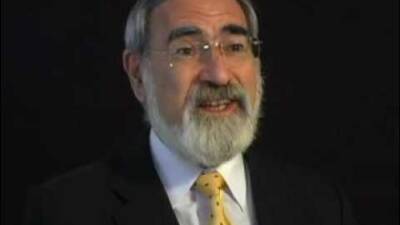
Rabbi Sacks on Future Tense Take Aways: 2
JInsider (March 2010)

Rabbi Sacks on the Universal Jewish Story
JInsider (March 2010)

Rabbi Sacks on Eco-Judaism Roots
JInsider (March 2010)
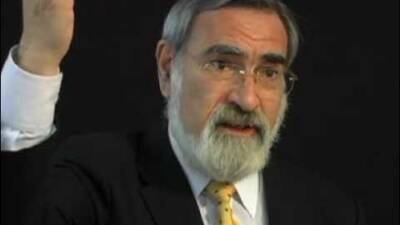
Rabbi Sacks on Peoplehood
JInsider (March 2010)

Rabbi Sacks on an Engaged Judaism
JInsider (March 2010)

Rabbi Sacks on Charity Priorities
JInsider (March 2010)

Rabbi Sacks on a Responsible Life
JInsider (March 2010)

Rabbi Sacks on Reconciliation
JInsider (March 2010)

Rabbi Sacks on Community Conflict
JInsider (March 2010)
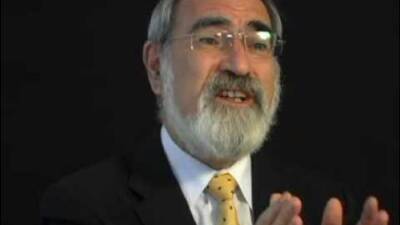
Rabbi Sacks on Particularism vs Universalism
JInsider (March 2010)

Rabbi Sacks on a Culture of Hope
JInsider (March 2010)

Rabbi Sacks on his Personal Hatikvah
JInsider (March 2010)

Rabbi Sacks on Israel and Jewish Society
JInsider (March 2010)

Rabbi Sacks on Torah in Today's World
JInsider (March 2010)

Rabbi Sacks on Prayer
JInsider (March 2010)

Rabbi Sacks on Indifference
JInsider (March 2010)
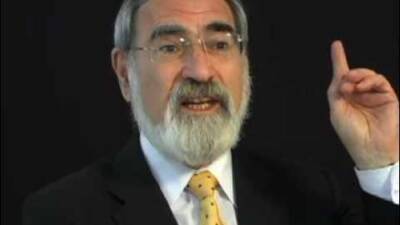
Rabbi Sacks on the Jewish Role in the World
JInsider (March 2010)

Rabbi Sacks on Torah and the Real World
JInsider (March 2010)
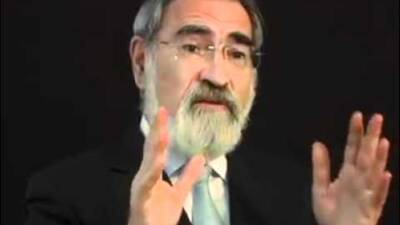
Rabbi Sacks on Free Market and Judaism
JInsider (March 2010)

Rabbi Sacks on Antisemitism
JInsider (March 2010)
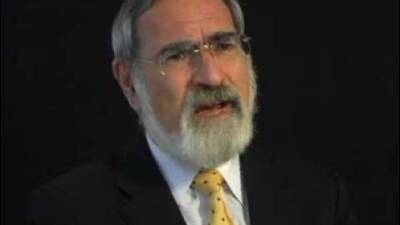
Rabbi Sacks on Future Tense
JInsider (March 2010)

Rabbi Sacks on Love as Deed
JInsider (March 2010)
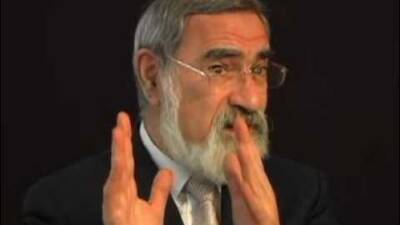
Rabbi Sacks on Combatting Antisemitism
JInsider (March 2010)

Rabbi Sacks on Material Loss
JInsider (March 2010)

Rabbi Sacks on the Antidote to Materialism
JInsider (March 2010)

Rabbi Sacks on Parenting
JInsider (March 2010)

Rabbi Sacks on a Tzedakah Tale
JInsider (March 2010)

Rabbi Sacks on a Family Story
JInsider (March 2010)

On the Internet and Judaism
JInsider (March 2010)

Rabbi Sacks on Plato's Ghost
JInsider (March 2010)

Rabbi Sacks on Optimism vs. Hope
JInsider (March 2010)

Rabbi Sacks on Victim Mentality
JInsider (March 2010)

Rabbi Sacks on Jerusalem
JInsider (March 2010)

Rabbi Sacks on Advice for our Times
JInsider (March 2010)

Rabbi Sacks on Fundamentalism
JInsider (March 2010)

Rabbi Sacks on Time
JInsider (March 2010)
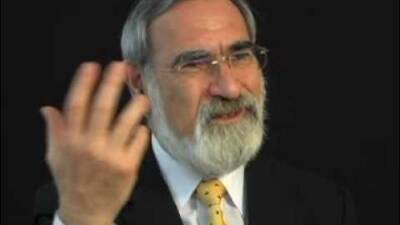
Rabbi Sacks on the Chosen People
JInsider (March 2010)

Rabbi Sacks on 21st Century Israel
JInsider (March 2010)
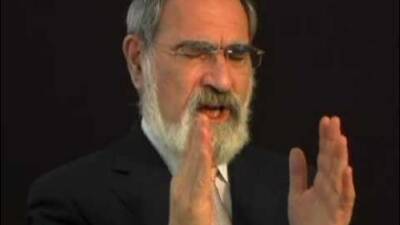
Rabbi Sacks on Understanding Jewish Exile
JInsider (March 2010)

Rabbi Sacks on Anger
JInsider (March 2010)

Rabbi Sacks on the Historical Evolution of Antisemitism
JInsider (March 2010)

Rabbi Sacks on Interfaith Relations
JInsider (March 2010)
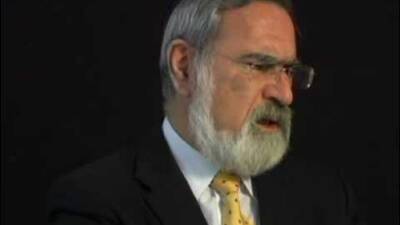
Rabbi Sacks on Coincidence and Providence
JInsider (March 2010)

Rabbi Sacks on Free Will
JInsider (March 2010)

Rabbi Sacks on Family and Marriage
JInsider (March 2010)

Rabbi Sacks on Tzedakah Defined
JInsider (March 2010)
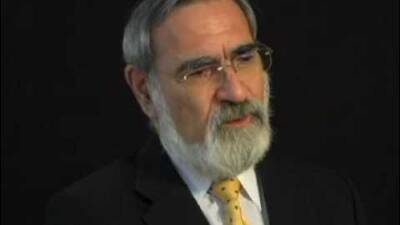
Rabbi Sacks on Daily Life
JInsider (March 2010)
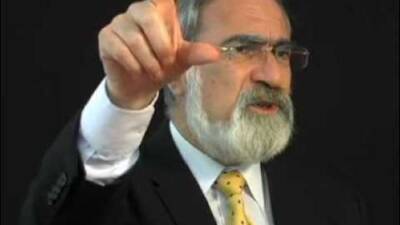
Rabbi Sacks on Being Jewish
JInsider (March 2010)

Rabbi Sacks on his Personal Rebbe, Rabbi Nachum Rabinovitch
JInsider (March 2010)
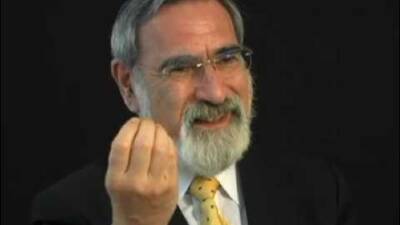
Rabbi Sacks on Connecting to God
JInsider (March 2010)

Rabbi Sacks on God and Evil
JInsider (March 2010)

Rabbi Sacks on Dialogue with Atheists
JInsider (March 2010)

Rabbi Sacks on Doubt
Jinsider (March 2010)

On Tikkun Olam
JInsider (March 2010)

Rabbi Sacks on a Response to Atheism
JInsider (March 2010)

Rabbi Sacks on Finding Purpose
JInsider (March 2010)

Rabbi Sacks on a Responsible Life - Example
JInsider (March 2010)

Rabbi Sacks on the Dignity of Difference - Part 2
JInsider (March 2010)

Rabbi Sacks on the Dignity of Difference - Part 1
JInsider (March 2010)
